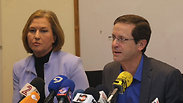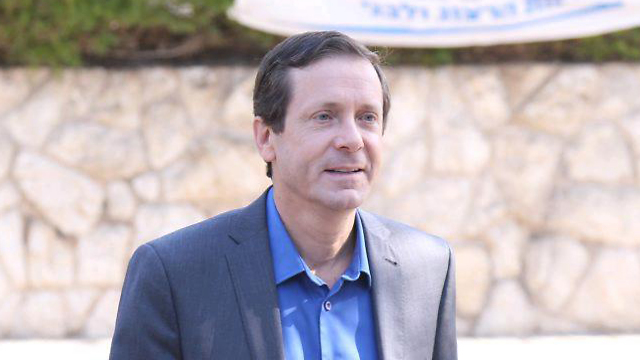
Herzog with Livni. Failed in reinforcing the team surrounding him
Photo: Motti Kimchi
The field of political marketing includes the term "permanent campaign." It means that media advisors don't stop working even after the votes are counted. The next morning, preferably after a good night's sleep, they start the next elections' race.
Isaac Herzog
has already begun, perhaps without knowing, his campaign for the next elections. In the meantime, he is doing a very bad job. There isn't a single banana peel he hasn't slipped on.
 The solution to Herzog's leadership weakness was to reinforce the leading team around him. He failed in that too. Tzipi Livni was a Siamese twin who didn't complement him, but chained him. In addition, she isn't perceived as a leader either and two minuses don't necessarily create a plus.
The solution to Herzog's leadership weakness was to reinforce the leading team around him. He failed in that too. Tzipi Livni was a Siamese twin who didn't complement him, but chained him. In addition, she isn't perceived as a leader either and two minuses don't necessarily create a plus.
Politicians' images are not built in one day or in the few months of the election campaign, but throughout their entire term, either in the coalition or in the opposition.
Leadership Crisis
Sara Miller
Op-ed: Did anyone who ever saw or heard Ed Miliband seriously believe that he was prime minister material? Did anyone who ever saw or heard Isaac Herzog seriously believe that he was either?
When a future campaign plan is prepared for a politician, an analysis must first be conducted to assess his image in the past. Herzog's main problem in the recent elections was his weak leadership presence. Late British Prime Minister Harold Wilson once said that one can't be prime minister without possessing a killer instinct. This trait cannot be acquired with the help of a voice trainer. When Buji Herzog looks someone in the eye, it's not in order to kill but in order to recite a poem.

Perhaps without knowing, Herzog has already begun his campaign for the next elections. In the meantime, he is doing a very bad job (Photo: Motti Kimchi)
The head of his security team, Amos Yadlin, wasn't even willing to get his hands dirty in a possible membership in the Knesset. He acted like a combat pilot who takes off for sudden attacks and then returns to his base, not always in one piece. In an aerial battle, with Minister Gilad Erdan on television, he was intercepted and crashed onto the ground. Manuel Trajtenberg may be able to explain his economic doctrine to students, but not to the middle class.
What can be said in Herzog's favor? That he is a serious politician, with principles, who will fight for them even when he is in the opposition. In the meantime, it seems he will be willing to do anything in order to enter the government. It's true that he announced in his own voice that he would not go in, but was against the Zionist Camp's Knesset faction making the decision. The voice is Esau's voice, but the hands are Jacob's hands. The fact that Netanyahu refused to promise Bennett that Herzog will not be added to the government indicates that the option is still open.
Assuming Herzog remains in the opposition, what will he fight for? Netanyahu retracted the equal share of the burden idea, and Buji didn't even tweet about it. Yair Lapid has a new campaign, and Buji is losing all the reservists from the protest tent. And what will become of his promises to the middle class, to the disadvantaged populations? Will they rely on the rich lawyer from Tel Aviv or prefer to trust Moshe Kahlon and Aryeh Deri who came from a childhood of distress?
What he is left with are the diplomatic and security issues. That has been the real distinction between the views of the right and the left in the Knesset throughout the years. The problem is that the Labor Party managed to rise to power, since the 1977 upheaval, only when it was headed by former IDF chiefs of staff, Yitzhak Rabin and Ehud Barak. David Ben-Gurion was only a sergeant in the British Army, but conveyed the strength of a major-general. Not Herzog.
So what is left for him to do, without charisma and without a political agenda? To crawl into the Netanyahu government or to vacate his seat in favor of someone else. Former IDF Chief of Staff Benny Gantz, for example.
















